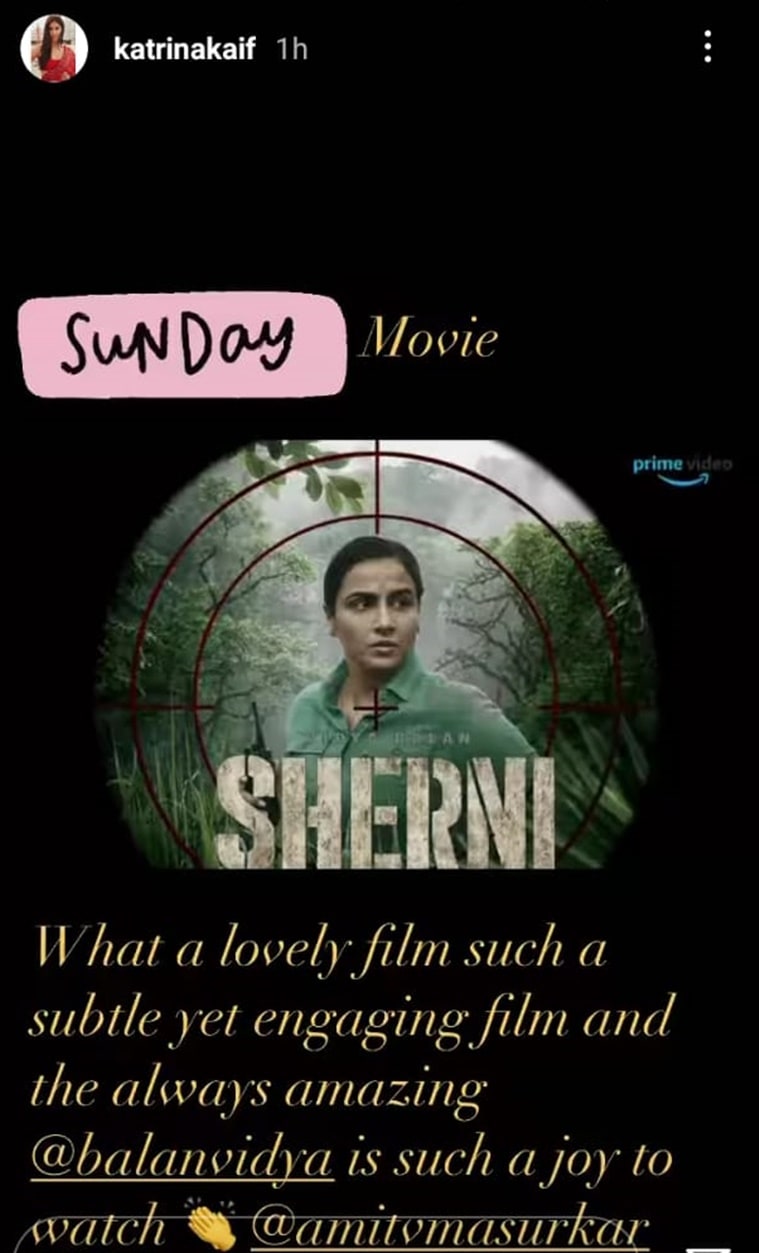the wire review https://thewire.in/film/sherni-film-review-vidya-balan-amit-masurkar-amazon-prime-video
The heart of many conflicts can be distilled into a simple sentence: Who owns the land?
It’s often followed by another question: What should we do with the ‘outsiders’ – or, according to some parochial nativists, ‘encroachers’?
But what if the self-righteous indignation about such questions is murky – and you risk losing your moral compass in the jungle of truths and myths? Amit Masurkar’s Sherni, premiering on Amazon Prime Video, tackles familiar and pertinent themes but broadens the conversation by adding an unexpected element: an animal, especially the species living on the margin of margins, tiger.
This narrative choice makes perfect sense, as dehumanisation – or rendering your adversary ‘animal’-like – is the ultimate weapon of systemic loathing. By making a tiger the film’s centrepiece, Masurkar stretches the gamut of possibilities, as if the literal and the metaphorical are playing a game of musical chairs.
Centred on a divisional forest officer, Vidya Vincent (Vidya Balan), Sherni tells a deceptively simple story: prowling tigers, scared villagers, harried administrators. In a Madhya Pradesh village – marked by the dangerous pattern of “farm, jungle, farm, jungle” – a T-12 tigress has begun preying on goats, the community’s prime source of income. Soon, straying villagers become her target – and people start to panic.
Vidya and her chief collaborator, Noorani (Vijay Raaz), a zoology professor in a local college, intend to capture the tigress and release her in a national park. But it’s not as straightforward, for this jungle has other animals – Vidya’s boss, Bansal (Brijendra Kala), a servile administrator; political rivals PK (Satyakam Anand) and GK (Amar Singh Parihar), milking the villagers’ fear before the election; Pintu (Sharat Saxena), a powerful and callous hunter — whose self-serving agendas impede progressive plans.

A still from ‘Newton’.
Much like Masurkar’s last acclaimed drama Newton, Sherni comes to life through distinct perspectives: of the officers, the politicians, the villagers – and of course, the tigers – who can be clearly demarcated into locals and strangers. If Newton had the line “Great change doesn’t happen overnight, sir; this jungle took years to grow”, then Sherni gives us this: “There used to be a forest here recently. Now it’s a copper mine.”
Like Newton (Rajkummar Rao), Vidya is an outsider – an outsider expected to ‘tame’ the native. Recently transferred from Mumbai, she’s worked for the last nine years with “no growth, no incentive” and plans to quit. But her husband (Mukul Chadda), a generic corporate type, tells her to stay, for the money is decent (and so are the benefits). Working in the field after a desk job of six years, Vidya is also getting used to another facet of her profession: the evident discomfort of men responding to a woman in power. Her subordinates praise their last boss, calling him a “superman”.
An MLA tells her, “I respect women. You’re like my sister.” When she takes a glass of whiskey during a department get-together, she doesn’t rejoin her colleagues but sits on the stairs at a fair distance, like a literal outsider.
Also read: My Film ‘Newton’ Is Not Cynical at All: Amit Masurkar
Sherni is often fascinating, but it takes time to find a compelling rhythm. The humour framing the sluggish government system doesn’t always work – and sometimes feels like an obvious checklist. A local leader – an assertive masculine figure whose followers wave yellow flags accompanied by the slogan, “Jab GK laut ke ayega, sabka time ayega” – exemplifies narrative fatigue, closing a layered political possibility. Some scenes – such as the conversation between Noorani and the villagers (“animals and people are not different; we must become friends with them”), the verbal repetition of a plot point (Pintu’s assistant stealing tiger urine from a zoo), the literal echoes of motifs (the forest officers making animal sounds during drunken revelry) – lack confidence, spelling out evident details and underscoring thematic preoccupations.
But the film finds its true purpose, when Vidya and Noorani dive deep into the investigation, absorbing different perspectives. It is here that Masurkar brings his A-game, like he did in Newton, of being an empathetic ‘outsider’, devoid of judgements, always willing to listen to all sides of the story, to understand, to feel – unencumbered by nationalist or self-righteous narratives. He has a terrific talent of telling a well-rounded story, where the protagonist, much like the filmmaker, is never above the people. There’s absolutely no condescension or sanctimony here – just genuine fondness and an ‘earth-felt’ attitude. This is not ‘both-sideism’ but moral clarity and artistic integrity.

A still from ‘Sherni.
The most potent conflict is embedded in the story. Many villagers are worried that, due to T-12’s predations, they’ll soon run out of goats (and the means to earn a living). But the forest department can’t kill the tigress, either – a species already struggling for survival, which also benefits the environment. So, Vidya inaugurates an employment initiative to compensate for the villagers’ wage loss and reduce their dependence on farming. But then comes a crucial twist. A woman says, “Madam, most of us can make beautiful things from bamboo.” Another says, “We can weave baskets and rice cleaners and even colour them.” As (an offscreen) Vidya encourages them, the camera focusses on a weaved basket; a woman picks it up, places it on her head – and drops an infectious smile. That smile, that scene, floored me.
We don’t see such stories in mainstream Hindi cinema that highlight the marginalised people’s right to self-determination – and does so while talking to them, listening to them, without making a big deal about it. What we typically see instead, in the movies of the postcolonial country, is the unfortunate tendency to talk down to our own people, while claiming to ‘rescue’ and ‘educate’ them. Western colonialism may be dead, but Indian imperialists are thriving.
The film’s empathy is thankfully not limited, even extending to wildlife and nature. But writing about it is one thing, showing it – using a different cinematic arsenal – is something else. We get plenty of forlorn long shots in the jungle, as if mimicking the tigress’ point of view.
We get an excellent line that shames our own bloodlust: “No animal is a man eater, sir. It’s just hungry.” We get cute-as-cat scenes of a kitten in Vidya’s house and cubs in a jungle. There is a world beyond our own vanities, the film constantly suggests: don’t shame or shun it; understand and accept it.
This is a story of displacement and homelessness, of unfair punishments trying to change fundamental behaviour. It is about environment and identity, stolen lands and manufactured conflicts, callous officials and vulnerable victims. Many characters, including regions and animals, live in no-man’s land. The villagers are torn between the two politicians. The construction of teak plantations for easy profit has deprived the goats, leaving them to choose between starvation and violent death. The officers switch between following their conscience and following orders.

A still from ‘Sherni.
Unlike many films contemplating the relationship between people and wildlife, often set around a forest, Sherni doesn’t leap with feral intensity.
It is, in sharp contrast, an understated piece – sometimes a bit too quiet – whose subversions extend to the level of performances. Raaz plays an atypical ‘serious’ role, which has no shades of absurdist humour or whimsical everyman, and he’s earnest enough to make us care for his cause.
Ditto Balan’s Vidya, a controlled minimalist performance that eschews her traditional forte: pleasing tenderness and fierce intensity. Here she seems to be doing so little – there are no grand declarations or gestures. It’s simply one tiring day after the other – a dozen defeats burying a tiny triumph.
It’s also a credible portrayal of gradual disenchantment – from family, higher-ups, institutions – to finally find her niche, whose preservation will (hopefully) not destroy her. Because in man-made jungles, both carnivorous animals and conscientious humans are on the verge of extinction.











 Katrina Kaif has only positive things to say about Vidya Balan’s Sherni. (Photo: Katrina Kaif/Instagram)
Katrina Kaif has only positive things to say about Vidya Balan’s Sherni. (Photo: Katrina Kaif/Instagram)












comment:
p_commentcount